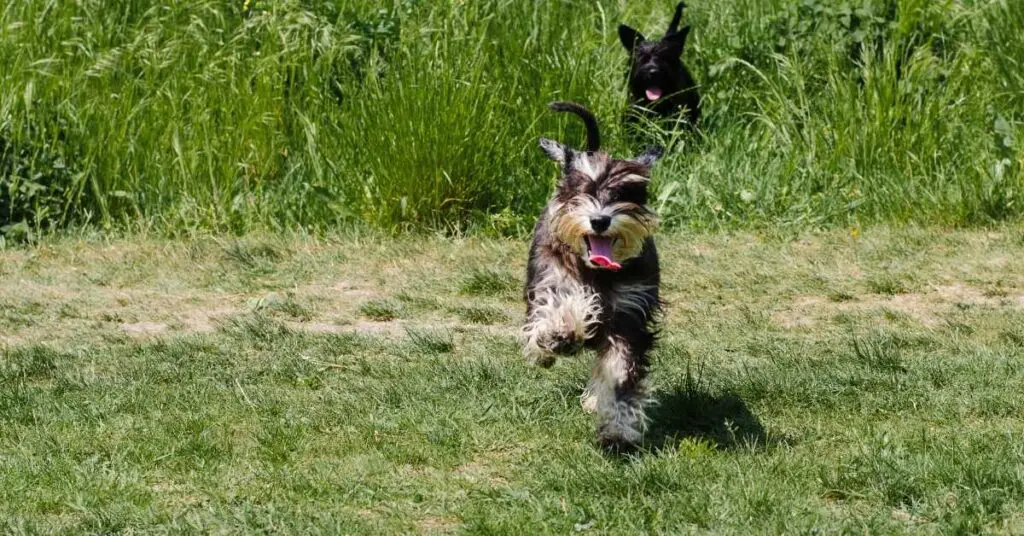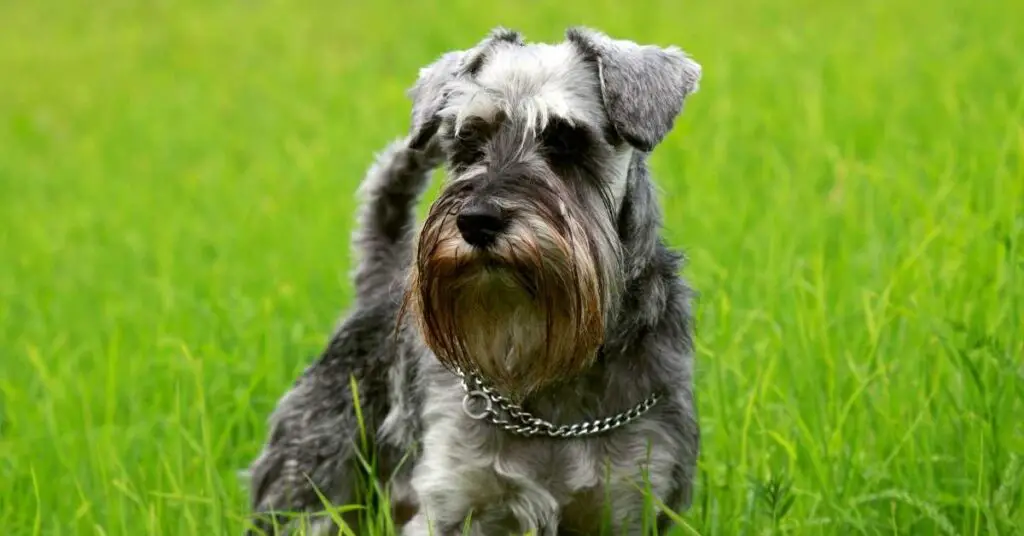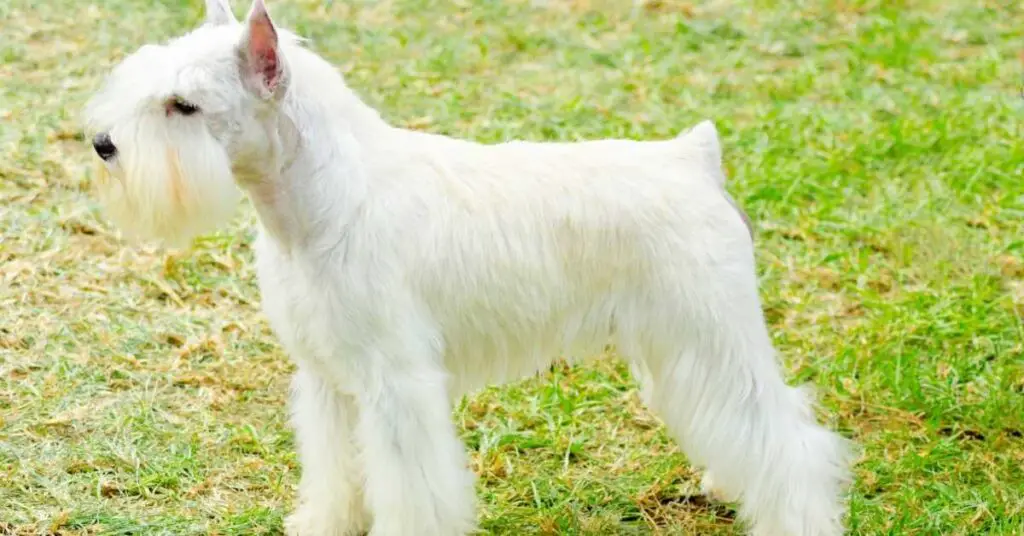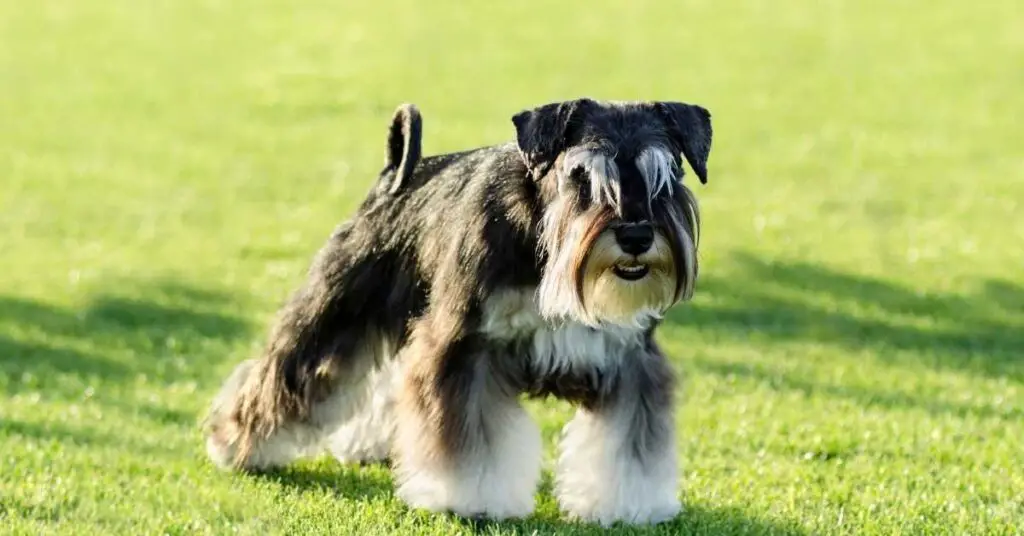We’re an affiliate. We may earn a commission on qualifying purchases through the links on this page. Learn more by reading our disclaimer.
Can Schnauzers Eat Carrots? Yes, schnauzers can eat carrots, even carrot tops. It is best if you feed them baby carrots as they are usually more tender than the larger carrots. It is also a good idea to cut the carrots up into small pieces so your schnauzer doesn’t have to chew too much on them.
Can Schnauzers Eat Carrots?
Schnauzers are loyal, friendly dogs that make great companion animals. They are also very active and intelligent, which means they need a lot of exercise and stimulation. But can schnauzers eat carrots? Read on to find out!

Are Carrots Good For Schnauzers?
Carrot is among the good vegetables that are consumable for a schnauzer. Carrot has so many nutrients essential for the growth and well-being of a schnauzer. Not all vegetables are suitable for schnauzers, but you can add carrots to their food. Carrot can be given raw or cooked. After adding both options to their food, you’ll get to know how your schnauzer likes it. Ensure you cut the carrot into bite-size pieces to prevent your schnauzer from choking on it.
Carrots are a good option for a dog snack because it’s low in calories, has high fiber content, and is high in vitamins. The crunching on the carrot is very good for strengthening the schnauzer’s teeth; the carrot is easily digestible for the dog.
Some nutritional benefits of carrot include:
- Carrots have carotene antioxidants that are great in the prevention of cancer.
- Carrots help in the improvement of eyesight.
- Carrots consist mainly of about 10% carbs and are rich in simple sugars, starch, and fiber.
- Contain Biotin, a type of vitamin H which is for protein and fats metabolism.
- It contains potassium which plays an important role in controlling blood pressure.
- It has vitamin B6, which does play a significant role in breaking down food into energy.
Carrot Nutritional Information
Serving Size: 100 grams
| Amt per Serving | |
| Water | 90.1 g |
| Total Fat | 0.47 g |
| Carbohydrate | 7.92 g |
| Fiber | 3.2 g |
| Sugars | 4.2 g |
| Calcium | 33 mg |
| Iron | 0.43 mg |
| Magnesium | 10.8 mg |
| Potassium | 210 mg |
| Vitamin C | 2.2 mg |
| Vitamin B-6 | 0.088 mg |
| Vitamin E | 0.69 mg |
| Riboflavin | 0.047 mg |
Learn more information about apple nutrition here.
Is It Ok to Give Your Schnauzer Carrots Every Day?
Yes, it is ok to give your Schnauzer carrots every day. Carrots are a delicious, affordable, and healthy addition to your Schnauzer’s diet. Carrots are rich in vitamins and minerals that make them a healthy alternative to dog treats when you are training your Schnauzer. You can give them to your dog either fresh or cooked and your Schnauzer will love them.
Are Raw or Cooked Carrots Better for Schnauzers?
Raw carrots are better for Schnauzers and other dogs. Vegetables lose some of their nutrients during the cooking process so raw carrots and vegetables are better because they have all of the vitamins and minerals intact. There have been studies to suggest that dogs absorb the beta carotene of the carrots better after the cooking process.
The best way to cook carrots or any other vegetable for your Schnauzer and preserve their nutrients is to lightly steam them using a steamer pot like this. Just get your water boiling in the pot and then put your veggies into the water for 2-3 minutes to steam them.
Are Baby Carrots Okay for Schnauzers?
Yes, baby carrots are okay for Schnauzers. Older Schnauzers can chew on larger carrots but small or baby carrots can be given to younger Schnauzers and even puppies if you cut them up into smaller pieces.
What Kind of Vegetables Can Schnauzers Eat?
Vegetables are very important for the growth of living things. Schnauzers also eat vegetables for their general well-being. The types of vegetables that schnauzers can eat are Peas, carrot, broccoli, green beans, green squash, yellow squash, asparagus, cauliflower, cucumber, zucchini, and spinach.
There are many types of vegetables; they are an important part of a schnauzers’ diet because they perform different functions that contribute to the functionality of schnauzers. Their skin, coat, and fineness, for example, depend largely on the addition of fresh vegetables to their diet. At least 10% of their diet should have vegetables; serving it fresh is mostly preferred by schnauzers. Vegetables can be grated, sliced, mashed, or cut into schnauzers’ food.
Introducing vegetables to schnauzers for the first time should not be difficult. Dogs are half omnivores and half carnivores. If you decide to cook the vegetable before giving your schnauzer, you can follow these steps:
- Choose one vegetable for a start.
- Properly wash any chosen vegetable from the list provided above.
- Get hot boiling water, put the vegetable in it and boil for few minutes.
- Please turn off the heat, remove the vegetables and allow them to cool.
- Cut or slice some and mix it with the dog’s food.
- Repeat this process all over by choosing a different vegetable every other week, and you would have successfully made vegetables a part of your schnauzers’ diet.

What Is the Best Vegetable for Dogs?
There is no best vegetable for dogs because they all perform different functions in the health and the general well-being of dogs.
So the best vegetables for dogs are Peas, kale, carrot, broccoli, green beans, green squash, celery, brussels sprout, Lettuce, yellow squash, asparagus, parsley, cauliflower, cucumber, zucchini, and spinach. Some of these vegetables are discussed below:
Kale: Kale is best served cooked because it’s known to upset their stomach when served to dogs raw. It’s rich in vitamin K and C, beta-carotene, Potassium, Magnesium, and Calcium.
Its nutritional benefits are limited to the following:
- Fights Arthritis
- Fights heart diseases
- Fights allergies.
Peas: Peas are a good source of folate, manganese, vitamin A, B1, B2, B3, B6, C, and K, zinc, potassium, copper, and iron. It is best served cooked for easy digestion.
Its nutritional benefits are not limited to the following:
- Gives energy
- It helps fight heart diseases
- It aids digestion
- It possesses anti-aging properties
- It helps in weight management and cholesterol control
Brussels Sprout: This vegetable is very rich in proteins, low fats, and fiber. It contains vitamins B1, B6, A, C, and K. Also, nutrients such as magnesium, potassium, and folate it’s best served cooked.
Its nutritional benefits are not limited to the following:
- It boosts the immune system.
- It helps in blood clot and repair of body tissues
- It helps reduce the risk of some canine cancers
- Aids metabolism
Brocolli: Brocolli are good source of folate, vitamin A, B1, B2, B3, B6, C and K, zinc, potassium, copper and iron. It is best served cooked for easy digestion. You should not add it in excess to dog food, and it can make up just about 5% of the dog meal.
Its nutritional benefits are not limited to the following:
- Gives energy
- It helps fight arthritic inflammation
- Brocolli boosts immunity
- It helps reduce the risk of some canine cancers
What Vegetables Can Dogs Eat Daily?
Dogs can eat pretty any vegetable daily. The portion of the vegetable served is what matters. The daily recommended percentage of most of the vegetables suited for consumption by dogs is about 5% of their entire meal per serving.
Vegetables serve major bodily functionalities in the lives of dogs; therefore, giving them vegetables is important. Cucumber, carrot, watermelon, kale, spinach, carrot, green peas, and green beans are all vegetables needed for a balanced diet and meal plan for dogs.
Vegetables are not be served in excess to dogs. If you observe that your dog has started rejecting a particular vegetable and gets all picky, don’t get worried. Change to another vegetable.
What Is the Best Fruit for Dogs?
Top on this list of the best fruit for dogs is Apples. Apples are rich in vitamins A, high in fiber, and contain zero fat. Apples come in different colors. They all taste the same, so the color of Apple you give your dog doesn’t matter. Dogs like humans love apples.
Dogs love blackberries as well, though you should mash the blackberries before giving them to smaller dogs. Large dogs can take the berries whole and chew away. It is not advisable to give canned berries to your dog, mostly due to the high sugar coating of the canned berries. Blackberries have many beneficial vitamins for dog health.
Blueberries are a delight to dogs, they can be taken frozen, and they have pretty same nutritional benefits as blackberries.
Banana: Banana is very high in vitamins and is loved by dogs. Too much of it, though, is not encouraged because of its high sugar content. Dogs, in general, love bananas.
Frequently Asked Questions (FAQs)
Here are some of the most asked questions:
Do Carrots Constipate Dogs?
No, carrots do not constipate dogs. Carrots along with vegetables like kale and cabbage are a great thing to give your dog if they are already constipated. Eating vegetables like this will help with constipation as they are high in fiber.
In Conclusion
So, can schnauzers eat carrots? The answer is a resounding yes! Carrots are just one of the many vegetables and fruits that are good for dogs in moderation. They provide essential vitamins, minerals, and antioxidants that help keep your pup healthy and happy. Just be sure to avoid giving your dog too many carrots (or any other high-sugar food), as this can lead to weight problems and other health issues.







